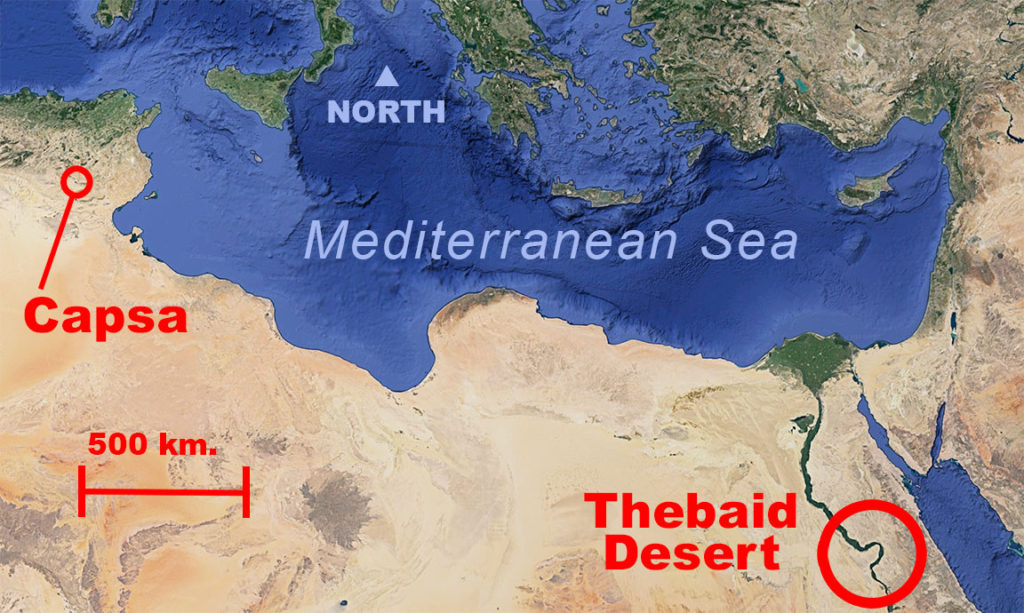From The Decameron by Giovanni Boccaccio: Day 3 Novella 10
This translation from The Decameron is (c) 2016 Christopher DiMatteo. All rights reserved.
NOTE ON THE GEOGRAPHY OF THIS NOVELLA:
The city called “Capsa in Barberia” in the text of Boccaccio’s Decameron is present-day Gafsa, ( ڨفصة ) in central Tunisia. The Thebaid desert refers to southern Egypt. It is named after the ancient Egyptian capital city of Thebes (also called Luxor), which is located there. It only takes a glance at a map to realize that the Thebaid desert is a very long way from Capsa (see below). It lies more than 1,500 miles, or almost 2,500 kilometers away, as the crow flies and about double that distance over land. That is obviously too far for it to be a reasonable destination of a few days’ journey, as the story suggests, yet it works as figurative language for a very remote place. This particular point of the Decameron seems to rest on some fuzzy geography.
Alibech becomes a hermit, and Rustico, a monk, teaches her to put the Devil into Hell; then later she is taken away from him and marries Neerbale.
Dioneo, who had listened closely to the queen’s story, hearing that it was finished and since he had the last turn of the day, without waiting for the order, smiled and began to speak:
Gracious ladies, perhaps you have never heard how to put the devil back into hell, and for that reason, without getting away from the spirit of the theme you have talked about today, I will tell you about it. Perhaps, once you have learned about it, you too may save your souls, and you may also learn that however much Amore likes to dwell on peaceful shores or in soft interiors, rather than dusty hovels, it doesn’t mean that sometimes, in thick woods or in the highest mountains or in deserted caves, his power may not still be felt: and the explanation for this is that everyone is subject to his power.
And so, as the story goes, in the city of Capsa in Barbary, there was a very rich man, who had, among his other children, a lovely and charming daughter whose name was Alibech. She was not a Christian, but she heard many Christians in her city often commending the Christian faith and their service to God. One day, she asked one of them in which way and how most easily could one serve God. He replied to her that those who best serve God stay away from the material things of the world, such as those who did so in the solitude of the Thebaid desert, where they had gone.
The young lady was pretty simple minded and perhaps fourteen years old, and so without reasoning but motivated by a childlike desire, without doing anything else and without telling anyone, the next morning she secretly set off for the Thebaid desert, all by herself. With great effort on her part and without much to eat, after some days she arrived in that lonely land. As she saw a little house in the distance, she went to it. She found a holy man standing at the door, who was struck with wonder at the sight of her and who asked her what she had come looking for. She replied that, inspired by God, she was looking to serve Him and she asked him to show her how to do that.
The holy man, seeing that she was young and very pretty, and fearing that the devil could tempt him if he kept her there, praised her good intentions and gave her some radishes and wild apples and dates to eat and water to drink, and told her, “Young lady, not far from here there is a holy man, who is a much better teacher for what you are seeking than I am. You shall go to him,” and he sent her on her way.
When she reached him she heard the same story from him, so she went further along, until she reached the cell of a young hermit, a very devoted and good person, whose name was Rustico. She asked him the same questions that she had asked the others. Rustico was thinking of giving himself a great test, so unlike the others, he did not send her away or down the road, but he kept her in his cell with him. When night came, he made a bed for her out of palm fronds and told her to sleep there.
Once that was done, it was not long before the temptations began to battle him. As he found that he was very much subject to this, it did not take too many assaults of temptation for him to shrug his shoulders and give in to it. So leaving aside the thoughts of holiness and the prayers and his discipline, considering her youth and her beauty, he took action. He was also thinking of what means and manners he would have to use with her, so that she would not take him for a dissolute man, because of what he wanted from her. At first he asked her certain questions, and discovered that she had never known a man and was as simple-minded as she seemed. So then he thought of a way that she could take care of his pleasure, as a way of serving God. First he told her at length how much the devil was the enemy of God the Father, and he told her furthermore of that service which would be to the pleasure of God, which would be to put the devil back into hell, where God the Father had condemned him to go.
The young girl asked him how this could be done, and Rustico replied, “You will soon find out, just do as I show.” So he began taking off the few clothes that had on, and she did the same. Then he knelt down as if to pray, and had her do the same, in front of him.
As Rustico was in that position, being more than ever in the throes of his desire and seeing her as beautiful as she was, the resurrection of the flesh came to him; when Alibech saw it, she was amazed and said, “Rustico, what is that thing that I see sticking out there, which I do not have?”
“My child,” said Rustico, “this is the devil that I was telling you about. Do you see? He is giving me so much trouble right now, so much that I can hardly stand it.”
So the young woman said, “Blessed be God, since I see that I am in a better condition than you, since I do not have that devil.”
Rustico said, “That is true, but you have something else that I do not have, which you have instead of this.”
Alibech asked, “What is that?”
Rustico replied, “You have Hell, and I’m telling you that I believe that God has sent you here for the salvation of my soul, and even as this devil gives me so much annoyance, if you would take pity on me and allow me to put the devil back into hell, you would provide a great consolation to me and God would be very pleased at your service, if that is what you came to this land to do, as you say.”
The young lady in good faith replied, “Oh father, since I have hell, let it be whenever it please you.”
Then Rustico said, “Bless you, my girl, let’s go and put him back in there so that he will leave me alone.”
Having said so, he placed her onto the bed and taught her how to place herself so they could imprison the one that is damned by God.
The young lady, who had never before put any devils into hell, at first felt some discomfort, which she told to Rustico, saying: “Father, this devil sure is a bad guy, a real enemy of God, that even in hell just as anywhere, he causes pain when he is put back in there.”
Rustico said, “My dear, it will not always be like that.”
And to prevent this from happening any more, six times did they put him there, before going to bed, until they had exhausted the devil’s wickedness and he willingly went back to rest.
As the devil kept on returning in the time that followed, the young woman was always obedient and willing to put him away, and she even began to take pleasure in it. One day she said to Rustico, “I see clearly now that the good men of Capsa were telling the truth when they told me how sweet it is to serve God. I sure can’t think of anything else that I like more than putting the devil into hell. So I would say that anyone who makes it his business to do anything but serve God, is a fool.” For this reason she often would go to Rustico and say, “Father, I came here to serve God and not to sit in idleness, let’s go and put the devil back into hell.”
And that they did, and one time she asked him, “Rustico, I don’t know why the devil would ever leave hell, since if he liked it there as much as hell likes to receive him and keep him there, he would never leave.”
So she invited Rustico often to the service of God, so much to his pleasure that it took all of the stuffing out of his doublet, and by that point he felt a chill where another man would be sweating; and so he started to tell the young woman that the devil was not to be castigated and put back into hell unless he raises his head in pride: “And we have, by the grace of God, punished him so well that he prays to God to be left in peace.” And that kept the young woman quiet for a while.
But as she saw that Rustico no longer asked her to put the devil back into hell, one day she said, “Rustico, if your devil has been so chastened that he no longer gives you grief, it is not so for my hell; so you would do well to use your devil to help calm my raging hell, just as my hell has calmed the pride of your devil.”
Rustico, who lived on roots and water, could scarcely answer those questions and told her that too many devils would be needed to calm her hell, but that he would do whatever he could. So for a few times he satisfied her, but so rarely that it was like tossing a fava bean into a lion’s mouth. And this did not seem to the young woman to be serving God as much as she wanted to, and she complained about it sometimes.
Yet while the discussion went on between Rustico’s devil and Alibech’s hell, between excessive desire and lack of potency, it happened that a fire broke out in Capsa, which killed Alibech’s father and all the rest of her family and burned their house down, which meant that Alibech became the heir to all of the family’s wealth. It was there that a young man named Neerbale, having spent his fortune living well, hearing that she was alive, went looking for her and found her, before the court could claim her father’s property as a man who had died without hiers, and to the great pleasure of Rustico and against her will, he brought her back to Capsa and made her his wife, and together with her did inherit the large estate.
However, when the women there asked Alibech how she had served God in the desert, before Neerbale had lain with her, she replied that she served Him by putting the devil into hell, and that Neerbale had committed a great sin in taking her away from that form of service.
The women asked her to explain how one puts the devil into hell. The young woman showed them, with a combination of words and pantomime. At this, they broke out in such great laughter that they are still laughing, and said, “Do not be discouraged, dear girl, you can do your good deeds here too; Neerbale will certainly help you in that way to serve God.”
They told that story all around the town so much that it became a common expression that the most pleasant way to serve God was to put the devil back into hell, so much that it has spread across the sea and still is known to us. For that reason, young ladies, you, who seek the grace of God, learn to put the devil back into hell, which is much to God’s liking and much good may be born and follow from it.
[•]


